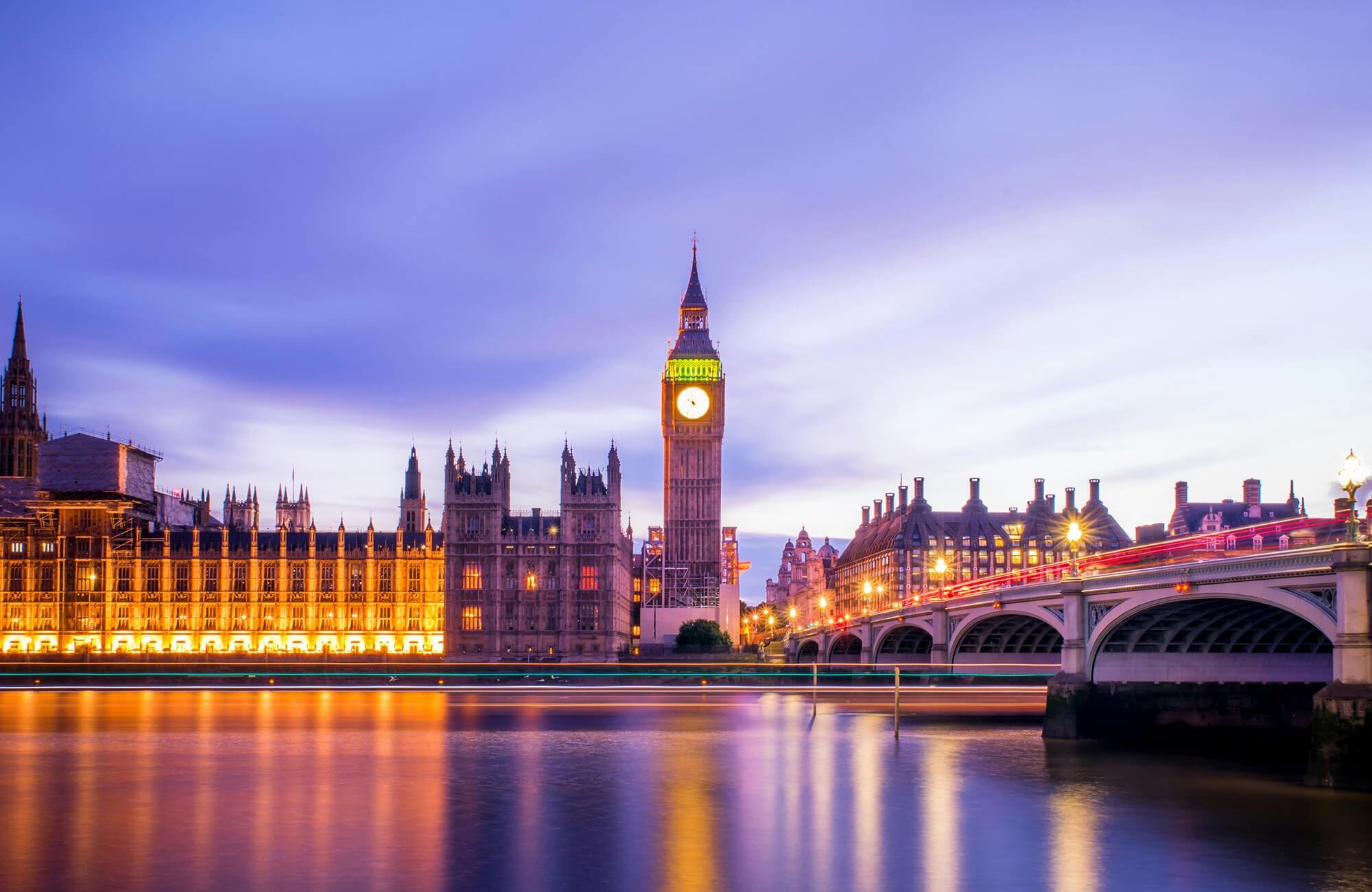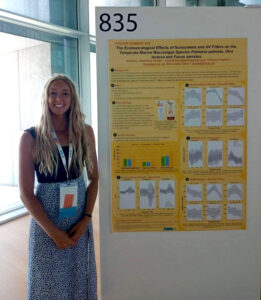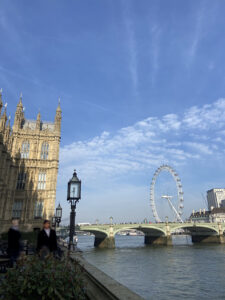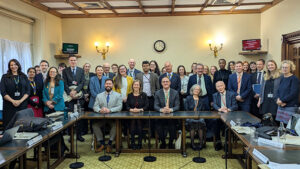Story
Reflections of a POST Fellow
20 June 2025
UK Houses of Parliament. Shreyas Sane | Unsplash
At the start of 2025, PhD researcher with the University of Plymouth and Plymouth Marine Laboratory, Anneliese Hodge, began a 3 month fellowship with the Parliamentary Office for Science and Technology (POST). Here Anneliese describes her experience at one of the longest running legislative science advice mechanisms in the world.

Can you tell us a bit about your research?
I’m a PhD researcher based at Plymouth Marine Laboratory and the University of Plymouth. My research focusses on the ecotoxicological effects of sunscreen ingredients on marine organisms, specifically the effects of ultraviolet (UV) filters which are added to sunscreens to either block, reflect or absorb the sun’s rays. I spend a lot of time in the lab, investigating what sort of biological and chemical effects sunscreens might have on marine organisms found in our temperate climates, such as seaweeds, phytoplankton and mussels.

How did your research inspire you to apply for a POST fellowship?
I found out about POST fellowships through my membership with the Royal Society of Chemistry, and via attending a series of workshops held at the University of Plymouth that aim to equip researchers with the skills to engage with Parliament.

I kept my eye out to see if there were any fellowships being advertised relating to my background and interests. That’s when the Royal Society of Chemistry POST fellowship was advertised, and I applied straight away!
Given the widespread use of sunscreen (most people use some form of sunscreen at some point in the year), my PhD research topic is quite relatable – so it could be of interest to Parliamentarians and policymakers for either public interest, or because of the well-known negative impacts of certain sunscreen ingredients that have made the news elsewhere in the world (like oxybenzone). Because of this clear link between my research and policy, I wanted to learn how to effectively communicate my research to a policy audience, particularly Parliamentarians. It is so important to know how to translate your science into something assessable for both the public and other interested parties! I wanted to learn, through transferrable skills, how my research could have national and international impact, and how it could potentially help to inform the policy of sunscreen ingredients here in the UK. Interestingly, a recent Nature Human Behaviour study found that the public have a relatively high level of trust in scientists, with half of the 70,000+ international respondents feeling that scientists should be more involved in policy and advocacy. So, it wanted to find out how I can get more involved in the policy space!
What was the application process like for you?
The application process involves a few different elements. First is an application form. This requires you to summarise your PhD topic to a lay audience in less than 200 words. There are then a couple of written questions that start with the typical ‘tell us about a time when…’. This tests your skills in written/oral communication and working with other people. In addition, you must also write a 2-page briefing document. POST provide a template for this but encourage you to write about a topic that you think would be of current interest to Parliamentarians. I chose to write mine on electrical waste (e-waste) and its environmental, health and economic implications. The briefing is an opportunity to show your ability to write succinctly and in a format that would be accessible to Parliamentarians, considering your language, sentence structures, balance and impartiality.
With your application you also need approval from your PhD supervisor to agree to the terms that they are happy for you to pause your PhD studies for the duration of the fellowship.
After the application sift, interviews take place which are attended by both the funder (in my case Royal Society of Chemistry) and a representative from POST. This was an extremely nerve-wracking experience! Questions ranged from assessing your knowledge of Parliament and POST, the House of Lords and House of Commons’ Libraries and more applied questions that would be relevant to writing a briefing.
What was your overall experience like?
I was incredibly overwhelmed during the lead up to the fellowship. I was super nervous and had a major case of imposter syndrome. But my nerves quickly settled when I started the fellowship. Albeit I was incredibly nervous for my first day, afterwards, I felt comfortable and welcome by everyone at POST and wider colleagues on the Parliamentary estate. Everyone I encountered was friendly and supportive, which helped a lot when settling in.

POST fellows don’t get to choose the topic they will be working on, this gets decided by the POST team and the POST board at board meetings throughout the year. I found out the topic I was going to be working on about 2-weeks before my start date. I had originally expected the topic to be related to chemistry in some shape or form, so I was totally thrown when I was told the topic was ‘Digital Transformation in Government’. I began to panic a little – I felt totally out of my depth with regards to writing for Parliamentarians about a topic I wasn’t at all familiar with (not even a little bit of knowledge!). And I must admit, I was a little disappointed that it wasn’t something more related to chemistry or the physical environment. But, despite my concerns, I got cracking on the topic and started conducting a literature review to develop an understanding of what digital transformation is, and what I was going to write about.
As the weeks passed, I was getting more and more stuck into the topic. I conducted interviews with stakeholders, committee members and peers to get their insight on the topic to feed into the briefing. This helps to provide a balanced and impartial overview of the topic. Once the briefing is complete, it gets sent for internal review, external review and finally sign-off and publication – so there are multiple rigorous checks in place to ensure the document is accurate, impartial, representative and accessible.
More broadly, the experience of being in Parliament was incredible. Working in such a historical and prestigious setting is both overwhelming and exciting (although again, major sense of imposter syndrome!) and I was always in awe walking around the estate.
What did you learn during your fellowship?
I learnt a lot! My overall aim for the fellowship was to learn how to write effectively for policymakers and I have come away with exactly that. My writing improved considerably over the duration of the fellowship. I could see improvements in my writing style, consciousness when writing to ensure everything was written in an accessible, non-jargony, impartial and succinct way. I learnt to check, check and recheck my terminology, sentence lengths and structures, question if the way I had written something could be misinterpreted, or if it could be understood by most people. I became critical of my own writing, and consequently, ended up also becoming critical of other’s too – for example, when reading a report, I sharpened my analysis and interpretation skills to not only think about how I interpret a sentence, but how someone else might interpret it too and how to communicate those perspectives effectively in the briefing.
Aside from writing, I also learnt a lot about the intricacies of Government – who is involved in what, the roles of local and central government, the House of Lords and House of Commons’ libraries, select committees, all party Parliamentary groups (APPGs) and the incredible amount of work taking place every day in Parliament by a whole host of different teams.
What other things did you get to during your fellowship?
I had the privilege of being able to join POST board meetings and APPG meetings which was a great experience. Whilst in London, I also took part in the STEM for Britain competition which is a national poster competition for early-career researchers. Whilst unrelated to the fellowship itself, it still took place in the Houses of Parliament. I was honoured to win gold in the category of Biological Sciences, and this too was a great experience to share my work with Parliamentarians.
During the period of my fellowship, I also had my first PhD paper published in Marine Pollution Bulletin entitled: ‘Ecotoxicological effects of sunscreen derived organic and inorganic UV filters on marine organisms: A critical review.’ This paper sparked a lot of media attention which was super exciting. I was interviewed by several media outlets, such as DW News, SKAI TV, Sierra Magazine and the New York Times, which provided me with a great opportunity to practice my public and media speaking skills.
What advice would you give to future applicants?
If you’re considering a POST fellowship, and you’re particularly interested in writing for policymakers or a career in that direction, I would say go for it! It is such an enriching experience, and you really do learn a lot. My advice – be prepared to be given a topic that might not be within a field or subject area that you are familiar with. It might be scary at first, and you might feel like you aren’t qualified or experienced enough to write about something completely unfamiliar, but you get to grips with it quickly, you have support at POST, and you interview lots of stakeholders who are familiar with the topic to feed into the research. Embrace the experience, enjoy London and enjoy being in Parliament!
What is next for you?
I am back at the lab now and ready to begin a new set of experiments. I am excited to continue my research, and hopefully one day… feed into some policy and regulation for UV filters in the UK! I have been busy writing up some manuscripts from my previous experiments which are currently in preparation, so fingers crossed for some new publications soon!
